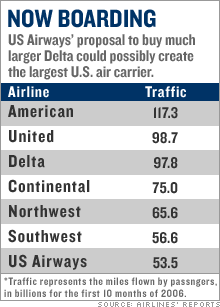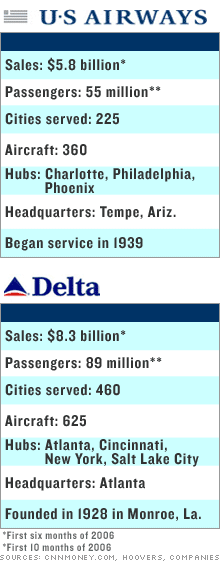Fasten your seatbeltsUS Air's offer to buy Delta could sharply reduce the number of major U.S. airlines - this time for real.NEW YORK (CNNMoney.com) -- The airline industry got shaken up this week by a multi-billion-dollar offer for a troubled carrier, with experts saying the bid would lead to more deals and leave just a handful of major airlines flying. That was the description of US Airways' $8 billion bid for Delta Air Lines (Charts) Wednesday. But it could just as easily have described the outlook on May 24, 2000, when United Airlines parent UAL Corp. (Charts) agreed to buy US Air (Charts) for $4.3 billion.
At that point back in the spring of 2000, the six major carriers were widely expected to shrink to four or even three from more mergers. But after more than a year of review, the Justice Department blocked the UAL-US Air deal. Then came Sept. 11, plunging fares and air traffic, followed by skyrocketing fuel prices and the growth of low-fare competitors. Four of the six major airlines have gone into bankruptcy court a total of five times since then. All have cut workers, renegotiated labor deals and slashed other costs. But more than six years later all six are still flying. "There's been a lot of conversation, but not a lot of consolidation," said Continental Airlines (Charts) CEO Larry Kellner at an investor conference in September. "If industry consolidation occurs on a broader scale, it's very important. But I wouldn't put the probability that high." But Kellner now has a minority view, especially in the wake of Wednesday's announcement. With airlines filling a record percentage of their seats and finally returning to profitability after more than $40 billion in industry wide losses from 2001 through 2005, the time finally seems right for the long-anticipated consolidation. Industry analysts and some executives say that despite Delta's stated desire to emerge from bankruptcy as an independent carrier, a deal will be made to buy the nation's No. 3 airline. If No. 7 US Air doesn't get it, people think it'll be because another larger airline beats it to the punch. And once one deal is done, other deals are widely expected to follow. "The industry only really needs about three full-service network carriers," said Ray Neidl, airline analyst with Calyon Securities, referring to the big airlines with national hub-and-spoke route systems. "That could very happen in the next two years. We've got too many airlines and too many hubs." Who's next? Philip Baggaley, Standard & Poor's top credit analsyt for airlines, said that assuming US Air does grab Delta, then American Airlines parent AMR Corp. (Charts) might well grab Northwest Airlines, which is also in bankruptcy and has almost no route overlap with American. And that could clear the way for United and Continental Airlines to get together. Northwest, which helped Continental fend off unwanted takeovers in the 1990s, today has the ability to block any deal for Continental by another carrier. But that would evaporate if Northwest itself is bought, or buys another airline. Baggaley said it will be difficult for Delta management to convince creditors, or the bankruptcy court, that it would be better for the airline to stay independent rather than accepting the best offer from another carrier. He said the best argument that Delta may have is if the Justice Department's anti-trust review seems to be dragging. "I think it's unlikely that there is no deal," he said. "If that happens, it's because the Justice Department unexpectedly blocked a deal. And if it appears likely some deal for Delta will go ahead, I think it's more likely than not that there will be some other transactions." The Wall Street Journal reported Friday that Delta CEO Gerald Grinstein and other executives at the Atlanta-based airline started lobbying creditors Thursday to support the company's plans to stay independent. Baggaley said a round of deals will pose risks for the airlines, especially if there is another downturn in the industry. "If Justice hadn't blocked United-US Air, they would have ended up filing for bankruptcy much sooner," he said. DePaul University professor Joe Schwieterman agreed that the time seems right for more deals, even if he expects different matchups. "United and Delta, while antitrust concerns may be less on a market-by-market analysis, would raise more eyebrows because of their size. But it's a match made in heaven," he said. "And I've always liked the Continental-Northwest matchup. They've done a lot of marketing together." Schwieterman said that if those are the combinations that take place, it's possible that American and US Air would get together. "American's weakness on the East Coast would make US Airways a prime potential partner," he said. But US Air CEO Doug Parker appears much more interested in being a buyer than a seller, having already brought US Airways out of bankruptcy in September 2005 and merging it with America West, which he headed at that time. Schwieterman said if American and US Air can't get together, AMR might look at other smaller carriers, such as Alaska Air. "Alaska would be interesting," he said. "It has strength up and down the West Coast that would present few antitrust issues. And it probably can't survive in its present form without greater critical mass." What's unlikely to take place is a combination of the traditional network carriers and some of the low-cost upstarts such as JetBlue, which are largely nonunion. "There still seems to be an iron curtain between those two," Schwieterman said. "Even with the changes in labor contracts that the old-line carriers have won, there's still an advantage at the low-cost carriers. You'd ruin it if you combined them." The rise of the lower-fare competitors such as Southwest Airlines (Charts) and JetBlue make it less likely the Justice Department will block a deal this time, analysts and officials said, as concerns about diminished competition have been lessened significantly in the last six years. What's driving deals US Air's Parker may have actually started this consolidation binge not on Wednesday, but more than a year ago, when as CEO of America West Airlines, he bought the larger US Air out of bankruptcy. The stock of the combined airline has soared 150 percent from the offer through the close of trading Tuesday. And it jumped another 19 percent after the deal was announced Wednesday, rather than selling off, which is often what happens to the stock of a company that announces an expensive acquisition. Parker said mergers can sharply reduce airline costs by cutting capacity and eliminating empty seats, dramatically improving the revenue for every mile flown. "There are not many industries more fragmented than the ones we participate in," he said in a conference call with analysts Wednesday. "We think it's the success of our own America West-US Air merger that is leading others in the industry to consider mergers of their own." So while some airline executives are voicing a desire to go it alone, others are joining Parker in advocating consolidation. "We believe that mergers in the airline industry have significant synergies, and we believe the industry needs to consolidate." said Jake Brace, chief financial officer of United parent UAL Corp., at an investor conference Wednesday. "We've been a proponent of it, and nothing we've seen has changed our view." Brace wouldn't comment on whether UAL is ready to start a bidding war for Delta, but he wouldn't rule it out, either, declining to comment on any discussions UAL may have had with Delta or other potential targets. "We'll be interested to see what happens with US Air and Delta," he said, adding that if consolidation starts, "our aspirations remain quite the same. If it makes sense for us to participate in, we will." |
|


